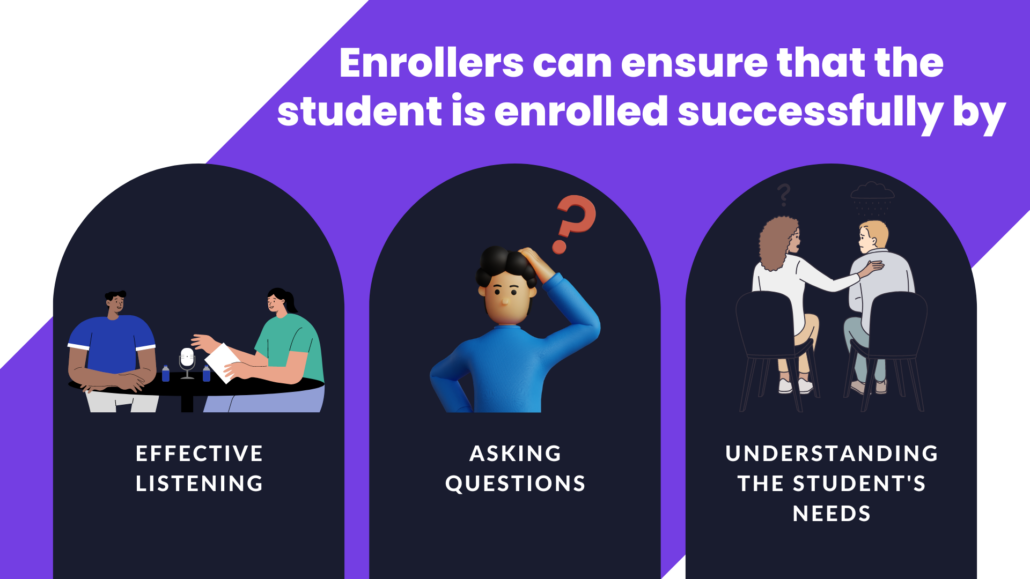Overview
As the industry of career school admissions continues to grow and evolve, it is increasingly important for admission officers to stay up to date with the latest trends and best practices. To help admission officers succeed in their roles, we have gathered insights from 10 top career school admissions leaders in the field. In this article, we will share the successes and secrets of these experienced professionals, providing invaluable advice to help admission officers overcome the challenges they may face in their careers.
Student Engagement
Admissions leaders play an important role in the success of their educational institution. Ensuring student engagement levels remain high throughout the admission process is one of the most important steps. To achieve this, admission officers must have contact strategies and follow-up cadences in place. They need to be able to communicate effectively with prospective students, as this will help to increase enrollment rates. By understanding the importance of student engagement, career school admissions leaders can continue to be successful and achieve their goals.
Be Curious and Passionate
When interviewing prospective students, professionals should approach the process with passion, curiosity, problem-solving, and care as if they are interviewing a family member. Doing so helps to build trust, knowledge, and understanding of the institution, allowing students to make an informed decision about their future careers. Such an approach can lead to an effective and successful relationship between the institution and the student.
DR. Carie L. Powers, Regional Director of Admissions, Unitek Learning

Build a Relationship and Trust
Admissions conversations should focus on creating relationships rather than viewing them as a single transaction. It is important for admission advisors to understand the student’s current situation before discussing the program or the next steps of enrollment. Asking the appropriate questions to keep the student engaged is key. By creating an environment of trust and understanding, the student can feel more comfortable in their decision to move forward with the enrollment process.
To build trust and understanding of the student’s educational objectives, it is essential for the advisor to approach the conversation with a positive attitude and to focus on listening to the student.
Scott Torgerson, VP Online Education, Ancora Education
Slow Is Smooth, Smooth Is Fast
In today’s fast-paced world, it is easy to succumb to the temptation of wanting to rush through tasks and activities to get to the end result as quickly as possible. However, when it comes to student enrollment, it is important to remember that quality is more important than speed. Taking the time to slow down and pay attention to minor details can save invaluable time and energy in the long run.
Enrollers can ensure that the student is enrolled successfully by taking the time to listen, ask questions, and really understand the student’s needs. This helps to avoid issues further down the line, saving time and energy.
So, when it comes to student enrollment, remember that slow is smooth, and smooth is fast. Taking the time to pay attention and understand the student’s individual needs will help to ensure successful enrollment.
Edward Cook, Corporate Director of Admissions, Asher College


Learn About Their Needs
Admission representatives are constantly engaging with potential students to ensure they enroll in their respective programs. Listening to the student’s story allows admission reps to comprehend the situation and offer the appropriate assistance to help them overcome any obstacles they may be facing.
To ensure that admission reps are successful in their endeavors, it is essential to understand the student’s needs
James Amps, President/CEO, AMPS International LLC
Student Retention
It is important to treat the education offered as something that will enhance the students’ lives and to demonstrate how their current efforts will help them achieve their long-term goals. By showing the link between the student’s short-term actions and their long-term ambitions, it can help to ensure student retention.
Be Invested in Their Journey
For many students, the process of seeking education can be daunting. Admissions Advisors must understand that each student has a unique story and be compassionate and supportive. Establishing trust is the key to successful collaboration and allows the student to feel comfortable in taking guidance when making important educational decisions. Ultimately, the student experience is the priority.
An effective Admissions Advisor should possess excellent active listening and interpersonal skills and must be invested in their journey with the student.
Abraham Cicchetti, Campus Director, Gurnick Academy
Be Informational
Admissions should be an informative process, not one designed to push students into a decision. Establishing a connection with the prospective student and their family is an important part of the process, as it can help to ensure the student will have a positive experience. The admissions process should be thought of as a service that can improve lives and should be handled with care.
Christopher Salvaggio, Chief Business Officer, Northwest Lineman College
Provide the Right Level of Support
As the post-pandemic landscape of the student lifecycle continues to evolve, it is essential for admissions advisors to provide the right level of support to ensure that education is the right fit for their students. With most students evaluating community colleges prior to career schools, it is important for admissions advisors to guide them through each step of the enrollment journey to ensure they make the right career choice.
Anthony Romo, Vice President of Enrollment & Graduate Services, San Joaquin Valley College
Career Success
Admissions advisors must have access to the capabilities and expertise required to thrive in the industry and be able to provide a more student-centric approach to their practices in order to promote student retention and career success. It is essential for admissions advisors to be proactive and make sure that they are up to date on the latest trends and technologies in order to stay ahead of the curve.
Creating a Rewarding Career
Creating a rewarding career in education often requires strong people management skills, the ability to listen attentively to students, and leadership. It’s important to be available to students and to use the opportunity to help them further their careers. Although it may not be the easiest job, it can be one of the most rewarding careers available.
Joy Mcclure, Chief Admissions Officer, Tricoci University
Be Original, Not a Copy
It is important to break up the day into quarters, setting a goal for each one related to calls, appointments, interviews, or applications. When engaging with a student, active listening should be practiced to ensure the best outcome for both parties. Ultimately, it is essential to remember that goals, large or small, are still goals, and the responsibility to achieve them lies with each individual. Institutions, such as hospitals and churches, measure performance, and it is important to stay accountable to both one’s own goals and those of their peers. With commitment, dedication, and a little extra effort, success is achievable.
Success in any endeavor requires a commitment to excellence. That is why it is important to follow the 80/20 rule, setting goals that can be achieved in 80 percent of the allotted time and striving for an additional 10 percent overachievement.
Maggie Zaman, Director of Admissions and Marketing, California Career Institute
Build a Culture of Winning
Creating a culture of success within an admissions team is essential for long-term success. To achieve this, fostering a culture of trust, praise, compensation, and accountability is key.
- Trust is essential in fostering a successful culture. A team that feels trusted to do their job will respond with enthusiasm, drive, and effort. Praise and recognition amongst peers will motivate top performers and encourage them to strive continuously for excellence.
- Compensation is also important in creating a culture of success. Rewarding team members for their hard work and dedication will create a feeling of appreciation and will incentivize them to continue performing at a high level.
Finally, accountability is essential in order to maintain a culture of success. Holding underperformers accountable encourages high performers to strive continuously for success.
By fostering a culture of trust, praise, compensation, and accountability, you can create a tenured and high-performing admissions team.
Victor Menin, VP Enrollment, My Computer Career

Conclusion
Post-secondary education is constantly evolving, and those involved must be ready to embrace new ideas and solutions to keep up with the ever-changing needs of students. Admissions professionals are essential in helping to ensure that students are properly informed and prepared for their transition into higher education.
To ensure that students are receiving the best possible experience, admissions professionals must be proactive and creative in their approach to the admission process. This includes providing students with detailed information on the program they are applying to, the admission requirements, and the school’s policies and procedures.
Additionally, admissions professionals must be committed to promoting the school’s academic, social, and financial resources, as well as enhancing the overall student experience. Furthermore, admissions professionals must stay informed about the latest trends and issues in post-secondary education and must be prepared to provide guidance and support to students during the application and transition process.
By taking these proactive steps, admissions professionals can help create a positive and successful experience for students and ensure they have the tools and resources they need to make informed decisions.
About LeadSquared
LeadSquared is an all-in-one CRM and marketing platform that provides career schools with the tools they need to increase enrollment and improve student engagement. With 600 education institutes using the platform, LeadSquared has become a powerful solution for businesses with large lead volumes and multiple sales channels. With offices located around the world, including the US, LeadSquared is able to serve customers in over 40 countries. The company headquarters is in Bengaluru, India. LeadSquared provides a student-first platform that helps institutions get the most out of their recruitment efforts.









